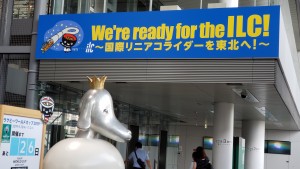 Keeping in step with the establishment of the International Development Team (IDT) in August 2020, a new organisation was formed in Tohoku, Japan, where the International Linear Collider is expected to be built.
Keeping in step with the establishment of the International Development Team (IDT) in August 2020, a new organisation was formed in Tohoku, Japan, where the International Linear Collider is expected to be built.
The organisation, the Tohoku ILC Project Development Center, is made up of 22 organisations, including universities, prefectural governments, cities and towns in the Tohoku area. It will deliberate on how to make the area a more welcoming place for those who will live there as they build the ILC.
“We are hoping to become the main actor to make the local region ready for receiving the ILC,” said Atsuto Suzuki, the chair of the new centre, president of the Iwate Prefectural University and former director general of KEK.
The Tohoku region in the northeast of Japan has been actively working on a variety of activities to invite the ILC to the area for decades. In the 1990s, accelerator physicists in Japan started investigating the stable bedrock in Iwate prefecture as a site to build a linear collider. In 1995, the 3rd Workshop on Physics and Experiments with Linear Colliders (LCWS95) was held in Iwate prefecture, which was the first international conference for the linear collider held in the prefecture, and the local government took the opportunity to establish a government office that focused on scientific projects. In the early 2000s, Japanese scientists conducted an assessment that led to the identification of 10 locations in Japan that had geological characteristics suitable for the construction of a linear collider. The Kitakami mountains, the current candidate site for the ILC, was on the list. Since then, Iwate prefecture has been consistent in voicing its interest in serving as the future home of the ILC.
Activities in Iwate expanded beyond the prefecture. In 2009, the Tohoku ILC Promotion Council, a collaborative industry-academic-government body in Tohoku was established. The council worked eagerly. They organised seminars for local industry to study ILC-related technologies and hosted the outreach events to gain public support and understanding. They also wrote reports, gave recommendations and filed petitions to the central government towards the ILC realisation. The Council published the Tohoku Master Plan in 2018 together with the Tohoku ILC Preparation Office, the subsidiary organization to the council that focused on the preparation to receive the ILC. The master plan summarises what the future Tohoku region will be like with the ILC and each sector’s potential responsibility regarding infrastructure development.
“Due to the great changes in the international situation around the ILC, we decided to take the next step to get ready for the ILC,” Suzuki said. The new organisation, the Tohoku ILC Project Development Center, is established as the successor organisation to the Tohoku ILC Preparation Office.
The activities include listing aspects of ILC siting where people in Tohoku could take a lead, such as studying issues related to environmental preparation and construction of the facilities, town planning to receive scientists and their families to the region, and promoting an understanding of the ILC to residents. The centre will also conduct studies on how the ILC construction affects the surrounding environment and the expected social and economic impacts. The centre’s members see the ILC as an opportunity to use the existing resources in the area and consider how they can make the most use of them.
Some Tohoku organisations have already looked into how they can make the time that foreign researchers and their families spend in the Tohoku area comfortable and safe.
“We are cooperating with those organisations and will conduct a serious investigation to make a realistic and concrete model plan,” Suzuki said.
They are also working towards the goal of having the local industry participate in the ILC construction and operation, which would have a positive impact on the local economy. The centre is planning to hold a series of seminars to introduce the technical and engineering needs for the ILC to Tohoku businesses and discuss how they might enter into the accelerator-related industrial sector.
Now is a difficult time to meet with people to get support for the ILC because of the COVID situation. The total number of people infected with COVID-19 in Japan is about 410,000 (as of February 2021), and those in Tohoku account for 1.8% of them. Even though the number of people infected with COVID-19 in Tohoku is much smaller than those in the metropolitan area, there are considerable restrictions to prevent the virus’ spread. Despite these constraints, people in Tohoku continues to work diligently to promote the ILC project. Last summer, Iwate prefecture filed an online petition to the minister. The Hokkaido / Tohoku Region Governor’s Association made an appeal to the government in August and October in writing. In September, the Tohoku ILC Promotion Council held an online lecture, and more than 600 people attended.
“We do whatever we can,” Suzuki said. “We actually visited the local governments together with researchers and explained the latest trends of the ILC and the activity status, exercising caution so as not to spread the virus.” The centre is also preparing to approach the Japanese government to secure a place for the ILC on the 2022 budget request.
“As the IDT’s activities to realise the ILC Pre-Lab proceeds, we, as a candidate site, are strengthening the cooperative relationship with IDT,” Suzuki said. “This is a very important time for the ILC. We hope to help IDT to complete its mission and successfully establish the ILC Pre-Lab.”
Members of the Tohoku ILC Project Development Center: Tohoku University, Iwate University, Iwate Prefectural University, Miyagi Prefecture, Sendai City, Kesennuma City, Tome City, Kurihara City, Osaki City, Iwate Prefecture, Morioka City, Ofunato City, Hanamaki City, Kitakami City, Tono City, Ichinoseki City, Rikuzentakata City, Oshu City, Kanegasaki Town, Hiraizumi Town, Sumita Town, Iwate International Linear Collider Promotion Council
Read more:

Recent Comments